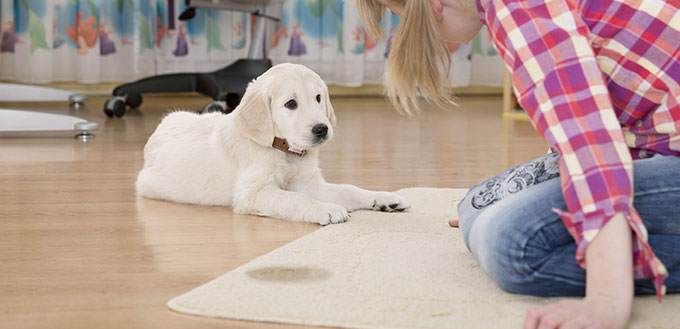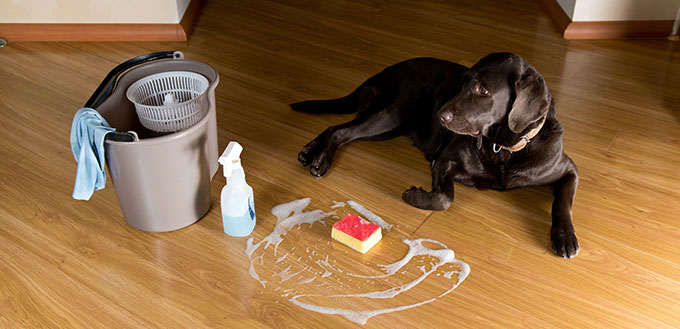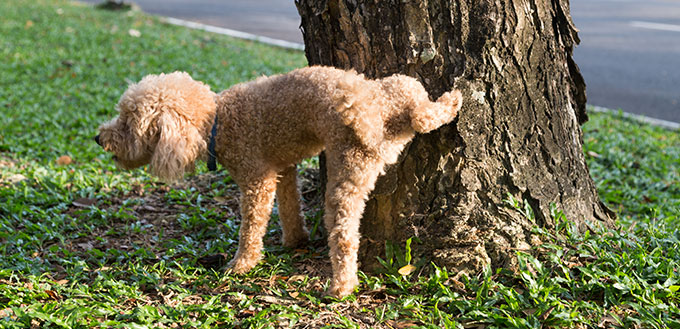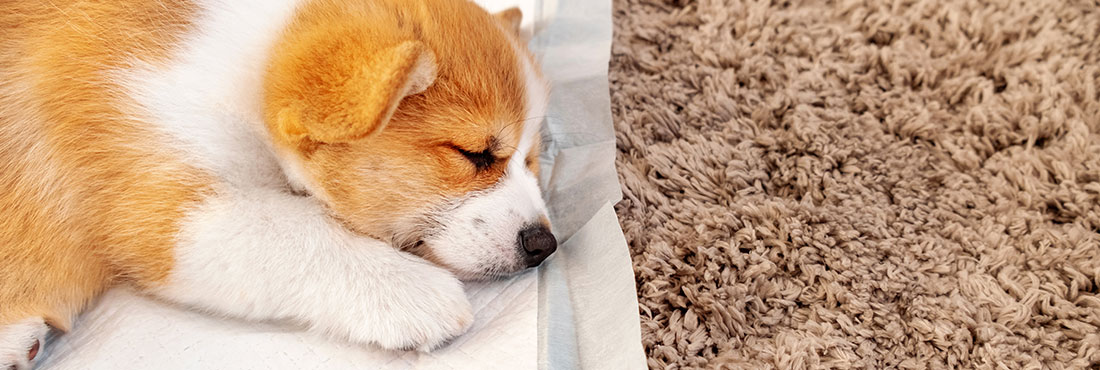It’s hard to beat that wonderful feeling of seeing your dog absolutely ecstatic to have you home. Whining, wagging, running, and jumping their joy is clear to see, but sometimes that excitement can overflow into a little golden puzzle on your nice new carpet. So if your dog pees when excited, or even when they are anxious, you’ll probably find yourself wondering what you can do to stop it. We have here a few tips and tricks to help you to figure out how to stop a dog from peeing when excited or nervous.
What is Submissive Urination?
Submissive urination is recognizable by a dog emptying their bladder when they are being approached, leaned over, being reached towards, or if someone shouts or speaks loudly and suddenly near to them. Their immediate reaction can be to urinate as a sign of submission to that person or animal.
Why Does My Dog Submissively Urinate?
There are several reasons that a dog may have this reaction:
- They’re Shy: A shy dog will be easily intimidated by unfamiliar humans or even other dogs and can fall back on submissive urination to stress that they are not a threat. It comes back to “fight or flight”, and a dog that can be highly anxious, shy, or timid will choose to fly if given the option.
- Reactive: There is the possibility that a dog could pee in response to a reprimanding tone of voice, which may be a knee jerk response following harsher punishment for accidents as a puppy. Equally, they may submissively pee if they are reached towards for the reason of wanting to avoid a disciplinary smack.
- Past Trauma: You may have the problem of submissive peeing with a rescue dog. Since most people are unaware of a rescue’s past trauma it can be hard to pinpoint the reason for this behavior, it is best to learn to recognize their triggers in order to proceed with training.
How Do I Recognize That My Dog is Peeing in Submission?
It is usually combined with submissive postures such as tucking their tail between their legs, hunching over, or even rolling onto their back to show their stomach.
How Can I Help My Dog With Submissive Urination?
The key thing to remember here is that submissive peeing is predominantly triggered when they are fearful or anxious, and it is best to remain calm in order to gain control of the problem. Here are a few points to remember when dealing with submissive urination:
- Chill out man: Scolding them will only make the problem worse, so be sure to maintain a relaxed posture when approaching them.
- Make them wait: Try not to greet your canine pal the second you walk through the door (I know un-imaginable but stay with me). Instead, delay it for a little bit and let them show you they are ready for a fuss.
- Change how you greet them: I know you can be just as excited to see your pooch as they are to see you, but keeping your greetings low key, and distracting your pup with a dog treat or two will go a long way. It is also worth noting that for most sensitive dogs it is better to go under the chin when you are greeting them, rather than the top of the head.
- Positive reinforcement: You have to treat dealing with urination problems like you would potty training and start slow, providing plenty of positive reinforcement along the way. So reward urine-free behavior with a treat and a calm and soothing tone of voice, to help to inch them past their anxiety.
- Keep others informed: Meeting new people can be a common trigger for anxiety in timid pups, and so be sure to inform new visitors of your dog’s tendency for submissive urination before they approach them. Make sure they are aware of the best greeting for your pooch.
You May Also Like: Pee Pads for Dogs
Why Does My Dog Pee When Excited?
So we’ve talked about submissive peeing, but what about dogs and puppies peeing when excited? Excitement Urination is about as prevalent as submissive urination and is recognized once again by body language: a wagging tail, ears stood high, and generally positive behavior. What do you do if the very reason they’re peeing is that they’re bursting with excitement and can’t wait for you to come home? You hardly get a chance to step through the door before you’re stepping in a puddle!
Well, the very answer to the question is in the title, excitement. Fortunately, however, it is mostly seen in puppies under the age of one and the majority of dogs grow out of it.
How to Stop a Dog From Peeing When Excited
Figuring out how to stop a dog from peeing in the house can be an absolute nightmare if you don’t know the cause. Fortunately, excitement and submissive peeing have clear reasons for the most part and can be much easier to figure out.
Excitement urination in puppies and dogs is very common but can be a little bit tricky. Fortunately, we have a few tips that might just help you out:
- Head straight outside: As soon as you enter the house, don’t stop for greetings, but go straight outside to the yard to encourage your puppy to pee before they can be rewarded with a fuss. If your puppy usually has you playing with them and petting them the second you get home, they will expect it. Once your puppy has peed outdoors give them a treat, and then proceed to fuss them.
- Be cool: I know that you just want to pet your puppy as soon as you enter the house, but you must refrain and make a point of using a calm demeanor as you take them outside.
- Avoid eye contact: There is a reason they tell you not to look a service dog in the eyes, and it’s because that type of engagement will naturally get them thinking you want to play. So avoiding direct eye contact with your puppy until you are ready to engage with them properly is crucial.
- Clean it up and walk away: When your puppy urinates excitedly, simply clean it up discreetly until they have been trained out of the behavior. Unfortunately, there’s no quick fix, so you may want to figure out a way to protect the flooring throughout your house in the meantime.
- Make guests aware: Before guests arrive, make sure they know to subdue their behavior and body language on entering the house so that the puppy doesn’t become over excited and urinate unexpectedly.
Alternative Options or Additional Aids
With excitement urination, there are a few other options you could consider to help to speed the process along.
- Obedience training: As a general rule, if you’re struggling to implement new behavior with your pooch, seeking out an obedience class can help you to figure out the most effective way forward, and potentially speed up the process.
- Extra Exercise: Giving your puppy a little bit more of a run around and play can help release some of that pent up energy so that petting them may not wind them up quite so easily.
- Adaptil: There are a few different herbal ways to approach calming a puppy, including sprays, collars, and plug-ins that can help to relax a pup that urinates out of excitement. Many pets have shown a great response to Adaptil as a relaxing agent.
Read here our article on the Best Calming Aid for Dogs.
How Long Can A Dog Go For Without Needing to Pee?
A great rule of thumb, if you’re trying to figure out how long your dog can go without peeing, is to assume that they can go for no longer than 8 hours. That is an average working day for many people, and really you shouldn’t be leaving your puppy for any longer than it takes for you to get home. Though health, breed, and age can factor into that time quite a lot.
Is Indoor Litter or Potty Training an Option?
If you are a dog owner that can work particularly long hours, and you worry about the problems that could arise from leaving your dog at home for that entire time, then doggy litter or doggy potty training is an option. In fact, some people have taken to using an indoor potty for their dog when they struggle with incontinence, be it due to being too young, or old to hold it in properly.
By teaching your dog to use a potty or indoor litter tray you could eliminate the risk of an accident. Alternatively, you can stick with the classic toilet training method, which in the long run will help your pup to stay comfortable for longer once they have figured out how to hold it properly.
Find out more about Indoor Potty for Dogs.
When Should I Take Them to The Vet?
Sometimes uncontrollable urination can be a sign of a deeper health complaint, where veterinary medical treatment would be the best course of action. Many pets tend to struggle with incontinence in their old age, but if you notice the following signs, it is a good idea to speak with your veterinarian to rule out the possibility of any of the following issues:
- Kidney Disease: Kidney failure can result in the body not properly filtering out waste, and instead distributing it back into the bloodstream. It is signified by excessive water consumption, excessive or lack of urination, digestive distress, lack of appetite, and weight loss.
- Urinary Tract Infection: UTIs are very common in dogs, but on the more extreme side can be a sign of diabetes and should definitely be checked by your vet. The symptoms include urine leakage, bloody urine, straining to pee, whining whilst urinating, constantly needing to pee but nothing happening, licking of genitals.
- Old Age Difficulty: A lot of people brush off incontinence as something that happens will all old ages pets, but the effect that old age has on their health takes its toll, and if your pup starts to pee when they shouldn’t speak to your veterinarian, they will be able to provide the best medical advice for your dog’s health.
The good news is that excited urination is something a puppy can grow out of in a matter of months, and submissive urination can be trained out with a bit of time and patience. So don’t fret too much if your furry baby is leaving you puddles because the chances are it’s easily rectified. Just keep an eye out for any changes that could be cause for concern, and keep a level head when your puppy can’t contain their excitement, they’ll figure it out eventually.
You May Also Like: Dog Food for Kidney Disease
Sources:
Note: The advice provided in this post is intended for informational purposes and does not constitute medical advice regarding pets. For an accurate diagnosis of your pet's condition, please make an appointment with your vet.










